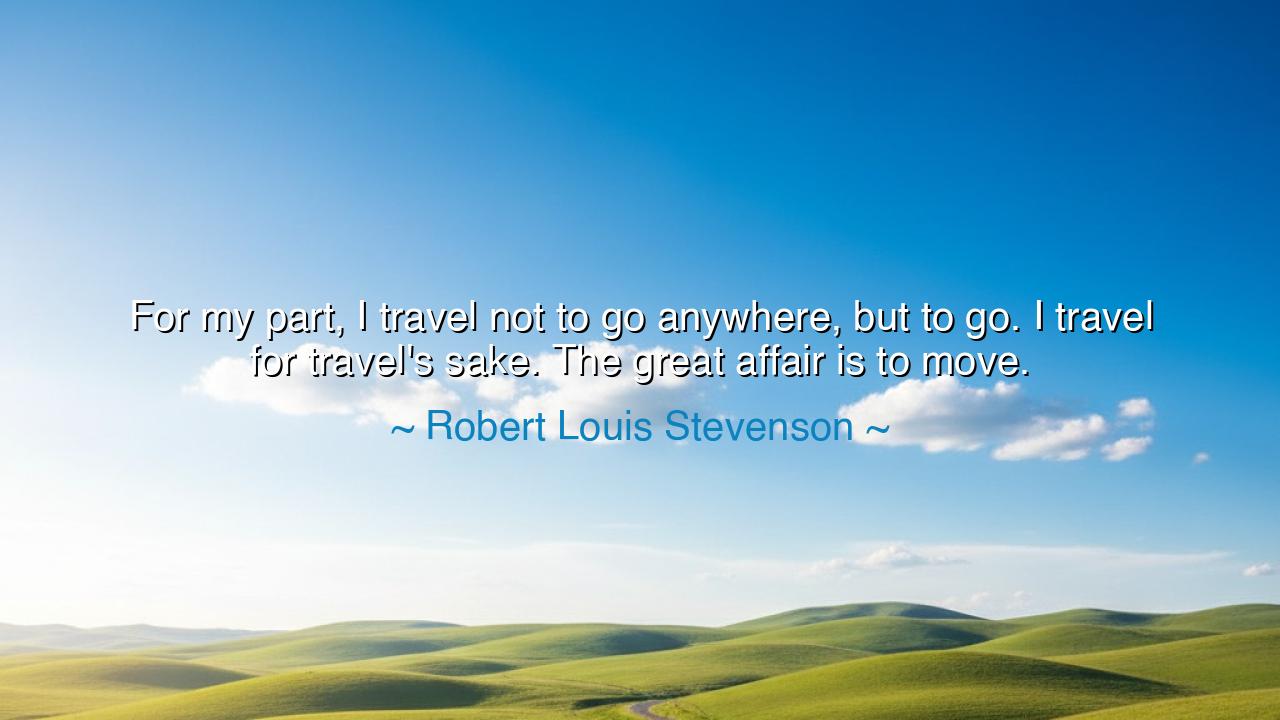
For my part, I travel not to go anywhere, but to go. I travel for
For my part, I travel not to go anywhere, but to go. I travel for travel's sake. The great affair is to move.






In the age of the restless heart, the writer Robert Louis Stevenson spoke words that echo through the corridors of time: “For my part, I travel not to go anywhere, but to go. I travel for travel’s sake. The great affair is to move.” In this simple declaration lies a truth both ancient and eternal—the yearning of the human soul not merely for destination, but for motion, for the act of becoming rather than the end of arrival. It is the spirit’s rebellion against stillness, the song of those who understand that life itself is a journey, not a resting place.
In the style of the wise ones of old, let us interpret these words as a hymn to the sacred art of movement. Stevenson does not speak of the traveler who counts miles or collects places like trophies. No—he speaks of one who moves for the joy of movement, who walks because the earth beneath his feet is alive and calls his spirit forward. To such a traveler, the road itself is the destination. The mountain is not climbed to conquer its height, but to feel the wind at its summit; the sea is not crossed to reach another shore, but to hear the rhythm of the waves echoing the heartbeat of the world.
In this truth, Stevenson joins the company of the wanderers of all ages—the pilgrims, explorers, poets, and seekers—those who understood that to move is to live. Think of Ibn Battuta, who journeyed farther than any man of his time, not for gold or conquest, but for wonder. Or of Marco Polo, who crossed deserts and empires not knowing what awaited him, drawn only by the magnet of the unknown. Even the prophets and sages walked, not to flee one land for another, but to meet revelation on the open road. For in every step lies the possibility of transformation. The great affair, as Stevenson declares, is not arrival, but the movement that awakens the soul.
To travel for travel’s sake is to honor curiosity as a form of worship. The mind that moves sees more clearly; the heart that wanders grows more compassionate. When we leave the familiar, we encounter ourselves anew. The road strips us of pretense; it teaches humility, patience, and wonder. Every sunrise in a foreign land is a reminder that life is vast, and we but small wayfarers upon it. Stevenson’s own life, filled with illness and uncertainty, was a testament to this truth. Though his body often failed him, his spirit never ceased its pilgrimage toward new horizons.
There is in these words a defiance of stagnation, a quiet heroism. The ancient philosophers spoke of the soul as a chariot in motion—ever seeking, ever learning, never still. When the soul ceases to move, decay begins. So too in our own age, where many rush toward destinations—wealth, fame, comfort—forgetting that the beauty lies in the journey itself. To move is to live consciously, to feel the pulse of existence in one’s veins.
Consider the sailor who sets forth though storms may come, or the poet who continues to write though no one reads. They, too, travel for travel’s sake. For the journey itself refines the spirit. The struggle, the uncertainty, the discovery—these are the elements that carve wisdom into the heart. The one who moves learns that the road is not a line from here to there—it is a circle that returns him to himself, richer and more awake than before.
So let this teaching be preserved: Do not live to arrive—live to move. Do not confine your soul to a single harbor, nor your mind to a single truth. Seek the motion that renews you—whether through travel, learning, creation, or change. For the still heart grows heavy, but the moving heart remains alive. Walk new roads, read new words, meet new souls. In doing so, you will find that the world itself is not a map of places, but a mirror of transformation.
And when you weary of the journey, remember Stevenson’s wisdom: the great affair is to move. Life itself is a pilgrimage without a final resting place. So step forward, not to arrive somewhere, but to become someone—ever changing, ever growing, ever journeying beneath the eternal sky.






AAdministratorAdministrator
Welcome, honored guests. Please leave a comment, we will respond soon